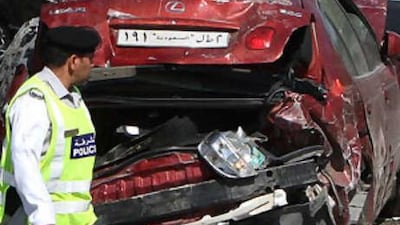DUBAI // A police chief is urging parents to stop buying their sons powerful sport cars and paying their traffic fines after concluding that these have become major factors in the recklessness responsible for much of the carnage on the roads. Col Saif Muhair al Mazrouei, the acting director of Dubai Police's Traffic Department, said the indulgence of better-off parents - buying ever more expensive cars and picking up the bills - encouraged "nonchalant and dangerous" driving attitudes among young men.
During the first half of this year, 433 road accidents in the emirate, resulting in 65 deaths, were blamed on drivers aged from 18 to 28. This compares with 380 accidents, involving 47 deaths, in which the drivers accused of fault were aged 30 to 40. In the same period, 40 people aged between nine and 26 were killed on the roads in the emirate while 541 were injured, 34 of them seriously. Most crashes involving young people are said to occur as a result of speeding or recklessness on the part of drivers aged between 20 and 25, almost always male and often at the wheel of a vehicle costing hundreds of thousands of dirhams.
Col Mazrouei said a lack of personal responsibility was leading too many young drivers to act with little or no respect for other drivers. "When young people see that their parents are prepared to buy them an expensive, fast car, pay for their unlimited fines and supply them with a generous allowance, then children fail to learn how to respect road laws," he said. It was time for parents to start taking responsibility for their children to help tackle a growing problem "which sometimes has devastating consequences".
"Most of those affected are young, Emirati youth," he said. "This is really unfortunate, especially since the local population doesn't even make up one million people." Young drivers who have to meet the cost of motoring out of their own pockets show greater restraint, he said. "Anyone who works to pay for their bills including their traffic fines can never be that careless." Col Mazrouei appealed to parents to show more firmness. "The biggest group of traffic violators is between 20 and 25 years of age," he said. "They are usually high school and college students. Their reckless driving also puts other people's lives at risk."
As a mark of the authorities' determination to apprehend more drivers violating traffic laws, 500 radars are to be installed on the main roads of Dubai in the coming months. "They will be installed in Dubai's most dangerous roads like Al Khail, Emirates, Sheikh Zayed," he said. All will be operational - and regularly checked for evidence of infringements - by the end of the year. Speed limits have already been reduced, for example to 100kph for 140kph on Sheikh Zayed Road, in an attempt to deter lawbreakers.
"Most violations occur by young people," Col Mazrouei said. "This is a problem we are suffering from because of parents who are not doing enough to discourage this behaviour. The real problem is with the parents of the young people who drive the cars. "Some people buy their kids a new car every year. Not just a new one, but a faster, more expensive one. "Adding to that, a generous allowance and paying for their fines, kids do not learn how to be responsible and adapt a careless and unchallenged attitude. We [the traffic department] regularly have parents who come in to pay their kids' fine. It runs into thousands in some cases, but they pay it."
"Parents should be more stern and teach their children responsibility. They should take a tough stance and if children [continue to break the law] they should cut their allowance and take the car away. This will force young people to respect the law because they will realise that the support is no longer there." Of a total of 147 road deaths in the Dubai emirate from January to June this year, the victims included 50 Pakistanis, 37 Indians and 22 Emiratis.
Last March a car crash in Al Ain claimed the lives of 12 people, several of them in their 20s. Col Khalifa Mohammad al Khaili, head of Al Ain Police's Traffic Department, blamed the horrific crash on reckless driving. @Email:rabubaker@thenational.ae

